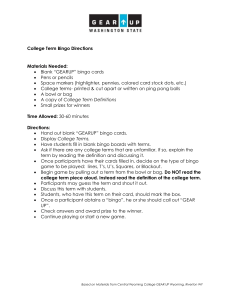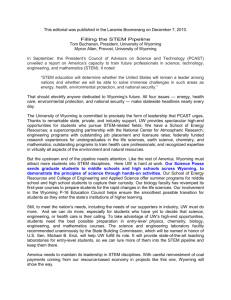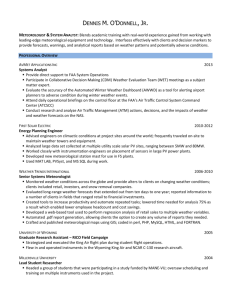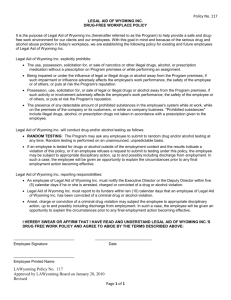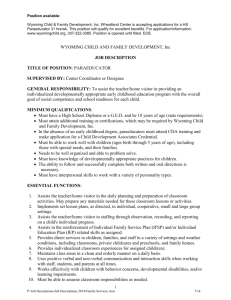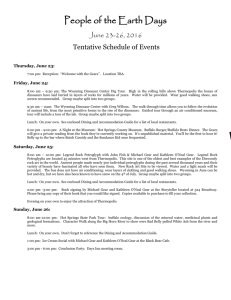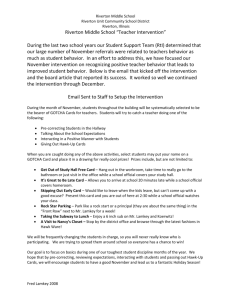Bingo Career Terms - Ready. Set. Grad.
advertisement
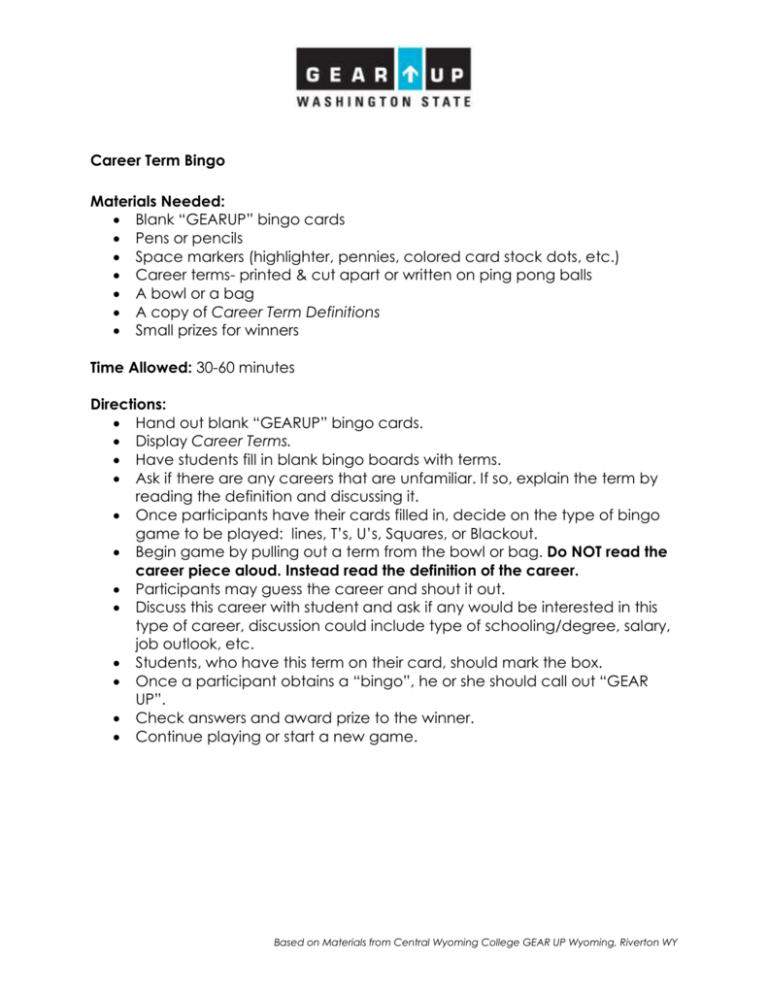
Career Term Bingo Materials Needed: Blank “GEARUP” bingo cards Pens or pencils Space markers (highlighter, pennies, colored card stock dots, etc.) Career terms- printed & cut apart or written on ping pong balls A bowl or a bag A copy of Career Term Definitions Small prizes for winners Time Allowed: 30-60 minutes Directions: Hand out blank “GEARUP” bingo cards. Display Career Terms. Have students fill in blank bingo boards with terms. Ask if there are any careers that are unfamiliar. If so, explain the term by reading the definition and discussing it. Once participants have their cards filled in, decide on the type of bingo game to be played: lines, T’s, U’s, Squares, or Blackout. Begin game by pulling out a term from the bowl or bag. Do NOT read the career piece aloud. Instead read the definition of the career. Participants may guess the career and shout it out. Discuss this career with student and ask if any would be interested in this type of career, discussion could include type of schooling/degree, salary, job outlook, etc. Students, who have this term on their card, should mark the box. Once a participant obtains a “bingo”, he or she should call out “GEAR UP”. Check answers and award prize to the winner. Continue playing or start a new game. Based on Materials from Central Wyoming College GEAR UP Wyoming, Riverton WY Sample Career Terms *Feel free to add other terms as desired. ACTUARIES AEROSPACE ENGINEERS BROADCAST TECHNICIANS APPRAISERS ATHLETIC TRAINERS AUDIOLOGISTS AUDITORS BIOCHEMISTS ANESTHESIOLOGISTS CARTOONISTS GRADERS /SORTERS CLAIMS ADJUSTERS COLLEGE TEACHERS COSMETOLOGISTS CURATORS DENTAL HYGIENISTS EDUCATOR/INSTRUCTOR ENGINEERS HUMAN RESOURCES (HR) /PERSONNEL FITNESS TRAINERS FASHION DESIGNERS ZOOLOGISTS FALLERS HYDROLOGISTS LIBRARIANS LOAN OFFICERS NUCLEAR MEDICINE TECHNOLOGISTS ONCOLOGISTS LAWYERS ROOFERS OUTDOOR GUIDES OPHTHALMOLOGISTS PHOTOGRAPHERS PHYSICAL THERAPISTS PSYCHIATRISTS PARK RANGERS WELDERS VETERINARIANS SALES/ MARKETING PROFESSIONALS SOCIAL SCIENTISTS TRANSLATORS /INTERPRETERS RADIOLOGIC TECHNOLOGISTS TOUR ESCORTS CHEFS WEB DESIGNERS OCEANOGRAPHERS REGISTERED NURSES (RNS) Based on Materials from Central Wyoming College GEAR UP Wyoming, Riverton WY Sample Career Term Bingo Definitions Actuaries: Use statistical data, including mortality, disability, and retirement rates, to forecast risk and liability for payment of future benefits. They are often employed by insurance companies, where they determine required premium rates and necessary cash reserves to guarantee future payments. Aerospace Engineers: Design, develop, and test aircraft, missiles, and space vehicles and oversee their production. They often specialize in one kind of vehicle, such as passenger planes, helicopters, or rockets. In some cases, they also work with earthbound vehicles, such as deepdiving vessels that are used to do research in the oceans and high-speed trains that float above their tracks. Aerospace engineering includes aeronautical engineering, which is limited to aircraft, and astronautical engineering, which is limited to spacecraft. Anesthesiologists: Physicians who focus on surgical patients and pain relief. They administer anesthetics, which are medicines to prevent patients from feeling pain and sensations; closely monitor patients' vital signs during surgery and adjust anesthetics accordingly; monitor patients through the first recovery stages after an operation; and administer appropriate medications during recovery. In addition to helping patients through surgery, anesthesiologists may also help treat patients with conditions causing chronic pain. Many specialize in specific types of problems, such as respiratory or neurological illness. More than ninety percent of the anesthetics used in health care are administered by or under the direct supervision of an anesthesiologist. Appraisers: Appraise real property to determine its value for purchase, sales, investment, mortgage, or loan purposes. Athletic Trainers: Help athletes recover from or avoid injury. They evaluate, advice, and treat athletes and help them maintain peak physical fitness. Audiologists: Help people who have hearing, balance, and related ear problems. These problems may be a result of trauma at birth, viral infections, genetic disorders, exposure to loud noise, certain medications, or aging. Using various types of testing equipment, audiologists measure patients' ability to hear and distinguish between sounds. In addition, they use computers to evaluate and diagnose balance disorders. Audiologists analyze these test data along with educational, psychological, and other medical patient data to make a diagnosis and determine a course of treatment. Auditor: Primarily performs and reports on internal or external quality system audits. Biochemists are scientists who study the chemistry of living things. Their work includes studying the complex chemical combinations and reactions involved in metabolism, reproduction, growth, and heredity. Broadcast Technicians: Behind the headliners who produce, direct, and act in radio and television shows, there is a cast of skilled workers who put the shows on the air. Broadcast technicians operate and maintain the electronic equipment that makes it possible to transmit radio and television shows. This equipment transmits, or sends, signals through the air. When these signals are picked up by television sets and radios, they are turned into sound pictures. Based on Materials from Central Wyoming College GEAR UP Wyoming, Riverton WY Cartoonists: Unlike visual artists, cartoonists are artists who communicate ideas through a combination of words and pictures. They use their work to tell stories, instruct and guide, and offer commentary on life and society. Cartoons can be used to present important issues to millions of people in an easily understood form. One of the most important qualities of a good cartoonist is the ability to present an idea in just a few words and a drawing. The drawings usually feature exaggerated actions that somehow reveal human nature. Sometimes cartoonists dream up their ideas, but they often read and study the news to get fresh concepts for their work. Chefs: Direct the preparation, seasoning, and cooking of salads, soups, fish, meats, vegetables, desserts, or other foods. May plan and price menu items, order supplies, and keep records and accounts. May participate in cooking. Claims Adjuster: Ascertain how much money people are entitled to receive on their insurance claims. Most claims adjusters work for property-liability insurance companies. Property-liability insurance covers such losses as fires, thefts, and accidents. People who buy this insurance protect themselves and their property against these events. The claims adjuster goes to the scene of the accident or fire to see that the claim is valid and that it is settled as quickly as possible. This work requires a thorough knowledge of insurance policies and practices. College Teachers: At colleges and universities, these people pass their knowledge and expertise on to the next generation of bankers, painters, chemists, and even teachers. They help their students to think critically as well as imaginatively; provide practical training; and shape their students' goals, careers, and lives. As experts in their subject fields, they also set standards for research—usually reflected in the articles and books they write—and expand the limits of scholarship and its importance in society. Cosmetologists: Care for people's hair, skin, and nails. They are also called beauty operators, hairdressers, or beauticians. Most cosmetologists work in beauty salons, and many have their own businesses. Some work in unisex shops, barbershops, department stores, hospitals, spas, resorts, and hotels. Cosmetologists work with many types of beauty products and often sell them at their salons as well. Curators: Are responsible for choosing and acquiring the pieces of art to be shown in a museum. They also decide how the pieces should be displayed and the order in which they appear. Curators select works for permanent display as well as works for special temporary exhibitions. Sometimes they organize educational and public outreach programs such as tours, workshops, and lectures to publicize their collections. Dental Hygienists: Clean teeth and examine oral areas, head, and neck for signs of oral disease. May educate patients on oral hygiene, take and develop X-rays, or apply fluoride or sealants. Educator/Instructor: Primary responsibility is instructing or training others on quality related topics, tools, and techniques. This person may be an employee of an organization or teach in a university or college setting. Engineers: Are skilled technical professionals who act as a link between design and implementation. They work to develop safe and economical solutions to practical difficulties. Engineers use scientific and mathematical knowledge and create marketable, workable solutions in accordance with the demands of customers, users, and others who benefit from their work. Engineers may be required to invent products, or develop sophisticated features for Based on Materials from Central Wyoming College GEAR UP Wyoming, Riverton WY existing ones. There are a staggering number of specialties for engineering professionals, and depending on the field one chooses, an engineer might have to design and develop aircraft, ships, nuclear plants, automobiles, buildings, chemicals, computers, electrical equipment, and a variety of other machinery. Fallers: Use axes or chainsaws to fell trees using knowledge of tree characteristics and cutting techniques to control direction of fall and minimize tree damage. Fitness Trainers: The growth in exercise programs in the United States has created a strong demand for instructors in recreational sports and fitness activities. Aerobics, running, weight lifting, body conditioning, and competitive sports are only some of the activities that have gained enormous popularity. Many people seek an expert to help them develop and maintain an exercise program. Fitness instructors may work for health or exercise clubs, sports training facilities, or gyms. Some work in the employee fitness center of a large company. Others are selfemployed and may offer training at their clients' homes. Fashion Designers: Every shoe, piece of clothing, and accessory on every hanger and shelf at every store has been designed by a fashion designer. Fashion designers examine trends in the kinds of clothing people are wearing, draw designs based on their ideas, choose colors and fabrics, and supervise the production of their designs. Fashion designers may have a specialty, such as clothing design, footwear design, or accessory design. Accessories are items like handbags, scarves, belts, and hats. Graders/Sorters: Grade, sort, or classify unprocessed food and other agricultural products by size, weight, color, or condition. Human Resources (HR) /Personnel: Are responsible for managing employee hiring, firing, and retention. Hydrologist: Studies properties of bodies of water, including their circulation, distribution and physical properties. A hydrologist can specialize in either underground water or surface water. Lawyers: Serve as both advocates and advisers. As advocates, they speak for their clients in court by presenting supportive evidence. As advisers, they counsel their clients on their legal rights and obligations. Lawyers—also called attorneys and counselors—can interpret laws, apply laws to specific situations, and draft new laws. Librarians: Administer libraries and perform related library services. Work in a variety of settings, including public libraries, schools, colleges and universities, museums, corporations, government agencies, law firms, non-profit organizations, and healthcare providers. Tasks may include selecting, acquiring, cataloguing, classifying, circulating, and maintaining library materials and furnishing reference, bibliographical, and readers' advisory services. May perform in-depth, strategic research, and synthesize, analyze, edit, and filter information. May set up or work with databases and information systems to catalogue and access information. Loan Officers: Work with businesses and individuals to help them acquire loans for personal or professional needs. More specifically, they evaluate loans, make necessary recommendations for clients, and authorize loans for real estate, commercial needs, or credit. Based on Materials from Central Wyoming College GEAR UP Wyoming, Riverton WY Nuclear Medicine Technologists: Prepare, administer, and measure radioactive isotopes in therapeutic, diagnostic, and tracer studies utilizing a variety of radioisotope equipment. Prepare stock solutions of radioactive materials and calculate doses to be administered by radiologists. Subject patients to radiation. Execute blood volume, red cell survival, and fat absorption studies following standard laboratory techniques. Occupational therapists: Assess, plan, organize, and participate in rehabilitative programs that help restore vocational, homemaking, and daily living skills, as well as general independence, to disabled persons. Oncologist: Physicians who inspect, diagnose, and treat cancer are known as oncologists. Oceanographers: Are scientists who study the sea. Oceanography incorporates features of many sciences, including biology, chemistry, geology, and meteorology. For this reason, oceanographers have varied backgrounds and do many kinds of work. Oceanographers may work on ships or in laboratories on land. Some work for private companies. Most work for research institutes or government agencies, or hold teaching and research jobs in colleges and universities. Ophthalmologists: Are physicians who diagnose and treat diseases of the eye, including glaucoma and cataracts; vision problems such as nearsightedness; and eye injuries. Optometrists and family doctors often refer patients with serious eye conditions to ophthalmologists. Because of their extensive training, ophthalmologists can often link eye problems to other disorders. For example, they are sometimes the first to detect brain tumors, diabetes, or multiple sclerosis. Outdoor Guides: Lead groups on recreational outing activities. They often specialize in their own areas of interest, organizing hunting and fishing expeditions or photographic and nature-study trips. Most guides work freelance and set their own prices. They attract customers by establishing a good reputation. The best guides are familiar with the territory in which they work and know the habits of the wildlife in that area. Most outdoor guides are expert hunters and fishers as well. Park Rangers: Teach people to respect the delicate natural balance of our national and state parks and forests. They are employed by the National Park Service, which is an agency of the U.S. federal government, and by state agencies. Rangers work throughout the country preserving the natural environment for future generations. They protect these areas by enforcing park rules and regulations, preventing forest fires, helping to maintain an ecological balance, and seeing that visitors plan campsites wisely. Park rangers are skilled campers with a great deal of knowledge about botany and wildlife. Perhaps the greatest danger to our parks is the danger of overuse: rangers watch and regulate the number of visitors to parks. They also provide information regarding park use and points of interest, issue fire permits, and collect fees. Party Planners: Conceive, organize, and execute special affairs such as corporate receptions, weddings, birthday parties, anniversaries, and bar and bat mitzvahs. They custom design an event to suit their customers' needs and budgets. Photographers: Combine artistic talent and technical skill to produce professional photographs. To use their tools—cameras, lenses, and lights—they must be highly skilled technicians. To create meaningful photographs, they must be able to arrange whatever they are photographing so that it will stand out clearly in the finished picture. Photographers work at many different kinds of Based on Materials from Central Wyoming College GEAR UP Wyoming, Riverton WY jobs. One photographer might make a career of taking pictures at weddings. Another might work in a laboratory taking scientific pictures through a microscope. Physical Therapists: Help patients suffering from disease or injury improve mobility, relieve pain, increase strength, and decrease or prevent deformity. They assess, plan, organize, and participate in rehabilitative programs. Podiatrists: Are medical practitioners who specialize in the treatment of sore, badly shaped, diseased, or injured feet and ankles. Podiatrists were formerly called chiropodists. They order Xrays and laboratory tests to diagnose patients' problems, which they treat by manipulation, massage, physical therapy, and surgery. Sometimes they provide patients with bandages, pads, braces, splints, or other supports. They may prescribe drugs, exercise, or special shoes. Because foot problems may be signs of general illnesses, such as diabetes or heart trouble, podiatrists may refer patients to physicians for treatment. Psychiatrists: Are physicians who specialize in the prevention, diagnosis, and treatment of mental disorders. They treat patients with mild cases of anxiety as well as those with severe disorders that can cause dangerous and bizarre behavior. Psychiatrists may also diagnose mental retardation and treat alcoholism. They often work with other mental health workers, such as psychologists, psychiatric nurses, and psychiatric social workers. Radiologic Technologists: Also called radiographers; take X-rays (radiographs), which are images of the inside of the human body. To take X-rays, radiographers position the patient, position the X-ray machine and other equipment, set controls, position the X-ray film, and remove and develop the film after the X-ray has been taken. Experienced radiographers may perform more complex imaging procedures, such as computed tomography (CT) or magnetic resonance imaging (MRI) scans. In addition, radiologic technologists are usually responsible for writing reports and maintaining their equipment. Registered Nurses (RNs): Work to promote good health and prevent illness. They educate patients and the public about various medical conditions; treat patients and help in their rehabilitation; and provide advice and emotional support to patients' families. RNs use considerable judgment in providing a wide variety of services. Roofers: Install and repair roofs made of metal, slate, tile, and other materials. Some roofers also waterproof surfaces, such as the insides of new swimming pools. Sales/ Marketing Professionals: Are responsible for selling products and services. Social Scientists: Study all aspects of society & of relationships to & in society; past events, human relationships, and human behavior among groups. Through their studies, social scientists analyze societal structure and suggest solutions to problems related to social, business, government and personal issues. Tour Escorts: Accompany groups of people on organized trips called "package tours." Most people who take escorted tours want the security and convenience of having transportation, accommodations, and sightseeing arranged for them. However, not all group tours are the same. There are tours for every budget, taste, and age group. Religious tours, cultural tours, reunion tours for veterans, and tours for professional and interest groups are just several Based on Materials from Central Wyoming College GEAR UP Wyoming, Riverton WY examples of outings that require the services of a tour escort. Translators/Interpreters: Convert one language into another. This service allows concepts and ideas to be exchanged between languages and cultures. Translators and interpreters are employed all over the world, helping people to communicate. Veterinarians: A doctor who specializing in studying, treating, and controlling animal injuries and diseases. They immunize healthy animals against disease and inspect animals and meat products to be used as food. Veterinarians also perform surgery, set broken bones, establish diet and exercise routines, and prescribe medicines for animals Web Designers: Are responsible for creating the look and feel of World Wide Web pages for a client's Web site. This involves developing a graphic design that effectively communicates the ideas being promoted by the Web site. A web designer may take part in the initial planning of a Web site, meeting with the client to discuss ideas for the layout and organization of the site, the types of colors or images to use (photos, illustrations, videos, etc.), and other matters concerning overall graphic design. Sometimes a web producer has already developed a basic concept for the web page. In this case it is the web designer's task to create a design that matches the producer's ideas. Welders: Use the process of heating and melting metal parts to join them together permanently. It is used to construct and repair parts of cars, airplanes, ships, and sheet-metal products. Welding is also used to join beams when constructing bridges and buildings. Some welders work at steel mills, railroad shops, and highway departments. Other welders are cutters, using their tools to cut metal into pieces, as required by a blueprint or design, or to cut structures into pieces so they can be discarded. Zoologists: Are biological scientists who study animals. They observe animals both in their natural habitats and in the laboratory in order to learn as much as possible about animal life. Zoologists study the origin and development of animal species, the habits and behavior of animals, and the interaction between animals and their environment. They also do research to learn how animal diseases develop and how traits are passed from generation to generation. Based on Materials from Central Wyoming College GEAR UP Wyoming, Riverton WY
